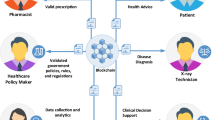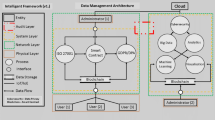Abstract
The healthcare sector is continuously evolving, and it is anticipated that the next healthcare model would be information-focused. Cloud computing technology can help the sector handle heterogeneous sources of data and the effective convergence of data. Due to security and privacy considerations, it is challenging to transfer a medical record from multiple hospital databases. Consequently, the article proposed a blockchain-based patient information management system by using the Blockchain-based Privacy-Preserving and Robust Healthcare data (BPPRH). This transfers the medical data to the patient through the cloud more securely. The cloud is modelled with the hypervisor and VMs. During the data transmission or storage in the cloud, there are several attacks like ransomware, malicious insiders, Man-in-the-middle attack, malware injection attacks, and Denial-of-Service attacks (DoS) occur in the network. Modified Fuzzy Particle Swarm Optimization (MFPSO) is presented to detect these threats. After detecting the attacks, Edge-Cloud-based Collaborative Systems (ECCS) prevent the data from attackers with the use of Regularized Maximum Likelihood Estimation, Inverse Network, and Shadow Model Reconstruction models. The results showed that the system provides better security with high accuracy of 99.32% respectively. The proposed Blockchain-based architecture is designed to contribute to the healthcare management systems’ robustness and to avoid recorded security limitations in commonly used systems for smart healthcare respectively.













Similar content being viewed by others
Data availability
Data sharing does not apply to this article as no datasets were generated or analysed during the current study.
References
Rohit, R., et al.: Disrupting healthcare silos: addressing data volume, velocity, and variety with a cloud-native healthcare data ingestion service. IEEE J Biomed Health Inform 24(11), 3182–3188 (2020)
Dwivedi, Ashutosh Dhar, et al.: A decentralized privacy-preserving healthcare blockchain for IoT. Sensors 19(2), 326 (2019).
Sivan, R., Zukarnain, Z.A.: Security and privacy in cloud-based E-Health system. Symmetry 13(5), 742 (2021)
Kashish, S.A., et al.: BAMHealthCloud: A biometric authentication and data management system for healthcare data in the cloud. J King Saud Univ-Comp Inform Sci 32(1), 57–64 (2020)
Gupta, A., Bansiya, A.: Utilizing cloud computing for stronger healthcare data security. Int J Sci Res Eng Trends 6, 2384 (2020)
Rani, S. Sheeba, et al.: Optimal users-based secure data transmission on the internet of healthcare things (IoHT) with lightweight block ciphers. Multimedia Tools and Applications 1–20 (2019).
Georgiou Dimitra, and Costas Lambrinoudakis.: Compatibility of a Security Policy for a Cloud-Based Healthcare System with the EU General Data Protection Regulation (GDPR). Information 11(12), 586 (2020).
Sahar, S., et al.: improved many-objective particle swarm optimization algorithms for scientific workflow scheduling in cloud computing. Com Indus Eng 147, 10664 (2020)
Ermakova, T. Fabian, B. Kornacka, M. Thiebes S. and Sunyaev. A.: Security and privacy requirements for cloud computing in healthcare: Elicitation and prioritization from a patient perspective. ACM Transactions on Management Information Systems (TMIS) 11(2), 1–29 (2020).
Zainuddin Nurbaini, et al.: Risk Evaluation Using Nominal Group Technique for Cloud Computing Risk Assessment in Healthcare. International J. Adv. Sci. Eng. Inf. Technol 10(1), 106–111 (2020).
Modi, Kirit, J., and Nirali Kapadia.: Securing healthcare information over the cloud using a hybrid approach. Progress in advanced computing and intelligent engineering Springer, Singapore 63–74 (2019).
Chen, Yiqiang, et al.: Fedhealth: A federated transfer learning framework for wearable healthcare. IEEE Intelligent Systems (2020).
Xu, Jian, et al.: Privacy-preserving data integrity verification by using lightweight streaming authenticated data structures for healthcare cyber-physical system. Future Generation Computer Systems 108, 1287–1296 (2020).
Chadwick, David, W., et al.: A cloud-edge-based data security architecture for sharing and analyzing cyber threat information. Future Generation Computer Systems 102, 710–722 (2020).
He, Zecheng, Tianwei Zhang, and Ruby Lee, B.: Attacking and Protecting Data Privacy in Edge-Cloud Collaborative Inference Systems. IEEE Internet of Things Journal (2020).
Xie, Shaohao, Fangguo Zhang, and Rong Cheng.: Security-Enhanced RFID Authentication Protocols for Healthcare Environment. Wireless Personal Communications 1–16 (2020).
Cao, Y., Sun, Y., Min, J.: Hybrid blockchain–based privacy-preserving electronic medical records sharing scheme across medical information control system. Meas Control 53(7–8), 1286–1299 (2020)
Qiu Han, et al.: Secure health data sharing for medical cyber-physical systems for the healthcare 4.0. IEEE Journal of biomedical and health informatics 24(9), 2499–2505 (2020).
Boumezbeur, I., Zarour, K.: Privacy-Preserving and Access Control for Sharing Electronic Health Record using Blockchain Technology. Acta Informatica Pragensia 11(1), 105–122 (2022)
Rawashdeh, A., Alkasassbeh, M., Al-Hawawreh, M.: An anomaly-based approach for DDoS attack detection in the cloud environment. Int. J. Comput. Appl. Technol. 57(4), 312–324 (2018)
Zou, R., Lv, X., Zhao, J.: SPChain: blockchain-based medical data sharing and privacy-preserving eHealth system. Inf. Process. Manage. 58(4), 102604 (2021)
Nguyen, C., Dinh, et al.: Blockchain for secure EHRS sharing of mobile cloud-based e-health systems. IEEE Access 7, 66792–66806 (2019).
Anonymous authentication scheme for smart cloud-based healthcare applications: Mehmood, Abid, et al. IEEE Access 6, 33552–33567 (2018)
Sahoo Prasan Kumar, Suvendu Kumar Mohapatra, and Shih-Lin Wu.: SLA-based healthcare big data analysis and computing in the cloud network. Journal of Parallel and Distributed Computing 119, 121–135 (2018).
Elhoseny, Mohamed, et al.: Secure healthcare data transmission model for IoT-based healthcare systems. IEEE Access 6, 20596–20608 (2018).
Ali, A., Almaiah, M.A., Hajjej, F., Pasha, M.F., Fang, O.H., Khan, R., Teo, J., Zakarya, M.: An industrial iot-based blockchain-enabled secure searchable encryption approach for healthcare systems using neural network. Sensors 22(2), 572 (2022)
Ali, A., Rahim, H.A., Pasha, M.F., Dowsley, R., Masud, M., Ali, J., Baz, M.: Security, privacy, and reliability in digital healthcare systems using blockchain. Electronics 10(16), 2034 (2021)
Almaiah, M.A., Ali, A., Hajjej, F., Pasha, M.F., Alohali, M.A.: A lightweight hybrid deep learning privacy preserving model for FC-based industrial internet of medical things. Sensors 22(6), 2112 (2022)
Almaiah, M.A., Hajjej, F., Ali, A., Pasha, M.F., Almomani, O.: A novel hybrid trustworthy decentralized authentication and data preservation model for digital healthcare IoT based CPS. Sensors 22(4), 1448 (2022)
Ali, A., Rahim, H.A., Ali, J., Pasha, M.F., Masud, M., Rehman, A.U., Chen, C., Baz, M.: A novel secure blockchain framework for accessing electronic health records using multiple certificate authority. Appl. Sci. 11, 9999 (2021)
Kumar, R. and Tripathi, R.: Secure healthcare framework using blockchain and public key cryptography. Blockchain Cybersecurity, Trust and Privacy 185–202 (2020).
Kumar, R. and Tripathi, R.: Towards design and implementation of security and privacy framework for internet of medical things (IOMT) by leveraging blockchain and IPFS technology. The Journal of Supercomputing 1–40 (2021).
Kumar, R. and Tripathi, R.: Building an IPFS and blockchain-based decentralized storage model for medical imaging. In Research Anthology on Improving Medical Imaging Techniques for Analysis and Intervention, IGI Global 916–934 (2023).
Kumar, P., Kumar, R., Gupta, G.P., Tripathi, R., Jolfaei, A., Islam, A.N.: A blockchain-orchestrated deep learning approach for secure data transmission in IoT-enabled healthcare system. J Parallel Distr Com 172, 69–83 (2023)
Kumar, R. and Tripathi, R.: Large-scale data storage scheme in blockchain ledger using ipfs and nosql. In Large-Scale Data Streaming, Processing, and Blockchain Security IGI Global 91–116 (2021).
Kumar, P., Kumar, R., Kumar, A., Franklin, A.A. and Jolfaei, A.: Blockchain and deep learning empowered secure data sharing framework for softwarized uavs. In 2022 IEEE International Conference on Communications Workshops (ICC Workshops) IEEE 770–775 (2022).
Wahab, O.A., Bentahar, J., Otrok, H., and Mourad. A.: Optimal load distribution for the detection of VM-based DDoS attacks in the cloud. IEEE transactions on services computing 13(1), 114–129 (2017).
Hamzeh, H., Meacham, S., Virginas, B., Khan, K., and Phalp, K.: MLF-DRS: A Multi-level fair resource allocation algorithm in heterogeneous cloud computing systems. In 2019 IEEE 4th International Conference on Computer and Communication Systems (ICCCS) 316–321(2019).
Funding
The authors declare that no funds, grants, or other support were received during the preparation of this manuscript.
Author information
Authors and Affiliations
Contributions
All authors contributed to the design and implementation of the research, to the analysis of the results and the writing of the manuscript.
Corresponding author
Ethics declarations
Competing interests
The authors have no relevant financial or non-financial interests to disclose.
Additional information
Publisher's Note
Springer Nature remains neutral with regard to jurisdictional claims in published maps and institutional affiliations.
Rights and permissions
Springer Nature or its licensor (e.g. a society or other partner) holds exclusive rights to this article under a publishing agreement with the author(s) or other rightsholder(s); author self-archiving of the accepted manuscript version of this article is solely governed by the terms of such publishing agreement and applicable law.
About this article
Cite this article
Kumar, M.S., Nagalakshmi, V. Secure transfer of robust healthcare data using blockchain-based privacy. Cluster Comput 27, 1275–1291 (2024). https://doi.org/10.1007/s10586-023-04011-z
Received:
Revised:
Accepted:
Published:
Issue Date:
DOI: https://doi.org/10.1007/s10586-023-04011-z




